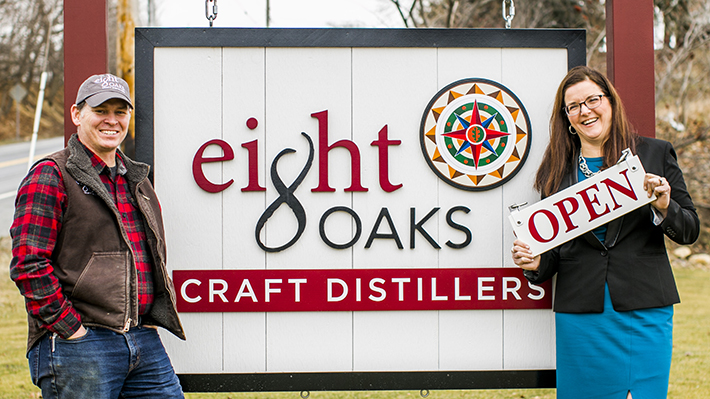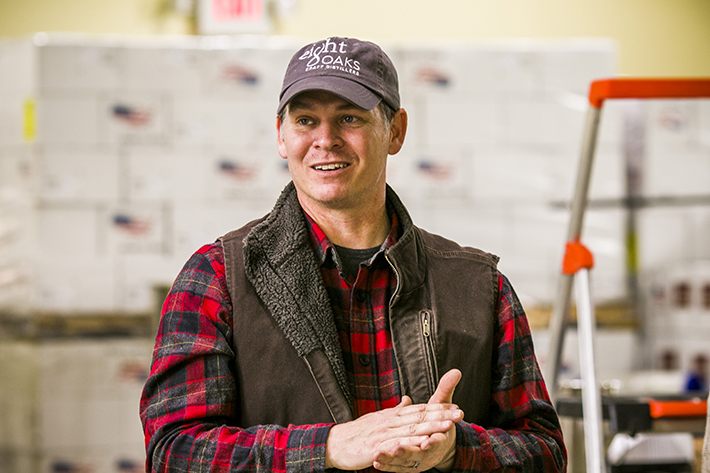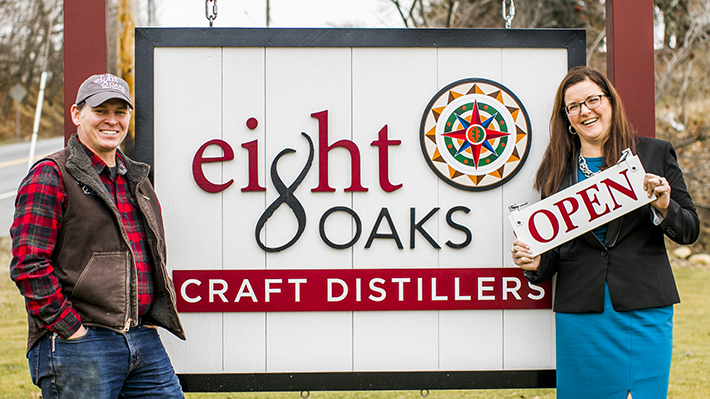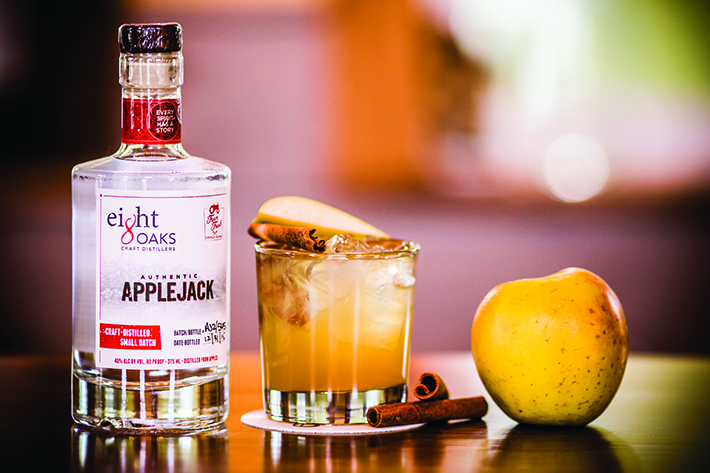
From Grain to Glass: Alum Opens Craft Distillery
A traditional red barn is hardly a noteworthy structure in Pennsylvania’s Lehigh Valley as family farms are still strung along this rolling stretch of countryside for miles in every direction. But neighbors and craft spirit connoisseurs know that the headquarters of Eight Oaks Craft Distillers, though disguised to blend with its neighbors, is no agricultural relic. The spirits being produced are the harbingers of a locavore revolution that took hold in farm-to-table restaurants and has now spread to craft spirit distilling.
Inside the “barn,” with bright white trim and a traditional Pennsylvania Dutch hex sign above the entrance, Chad Butters MBA ’12, the owner of Eight Oaks, and his team of family, friends and investors have opened a craft liquor distillery and tasting room where they serve cocktails and gather direct, unfiltered feedback on a product line that currently includes vodka, gin, rum and a lesser-known spirit called applejack.
Among his neighbors in Lehigh County, Chad is a relative newcomer. He first arrived in the area approximately eight years ago when he was stationed at Naval Air Station Joint Reserve Base Willow Grove. A 25-year veteran of the Army as a Black Hawk helicopter pilot, Chad and his family had endured many moves, having never been stationed in a single place for more than a few months, until a deployment in Willow Grove, Pa., which lasted eight years. In that time, the rolling hills of the Lehigh Valley started to feel like home to him and his wife. “We weren’t born here, but I like to say that we got here as fast as we could,” explains Chad.
As they looked ahead to a career after the military, they let themselves dream and gradually narrowed their options. The least negotiable element of the plan was that whatever came next would need to keep them close to home. Military travel had offered its adventures, but it was time to focus on family and friends.

“I knew I was interested in agriculture and wanted something that didn’t involve travel. My wife and I wanted to spend more nights together, and we wanted a family business,” says Chad.
With only the first hints of a business plan, Chad enrolled in the Drexel LeBow Online MBA to learn business skills that life in the military hadn’t provided. “Things like generating revenue, paying taxes and accounting for employee benefits did not come from the Army,” he says. “But discipline of thought transfers. You have to be able to have a disciplined, methodical approach.”
As he pursued his MBA, Chad continued to narrow the focus of his post-military career move. He became enamored with the farm-to-table movement that had caught on across the country. Drawn to the link between agriculture and local consumers, he considered options including brewing beer or starting a winery, but dismissed both as somewhat saturated markets with too narrow a space for creativity.
A new possibility that offered an ideal blend of the business and lifestyle Chad envisioned emerged with the signing of Pennsylvania Act 113. This bill, which became law in December 2011, made “limited distillery licenses” available in Pennsylvania. The new license made it possible for a craft operator to distill, bottle and sell their liquor all in one building. It also allows for a tasting room, a fundamental part of the direct customer-distiller relationship vital to the unique locality of the “grain-to-glass” craft distilling movement.
To Chad, distilling looked like a fit for the post-military lifestyle he was seeking. “It’s a thing that you can do together as a family, and it keeps you close to home,” he explains. While still on active duty, Chad began putting his newly acquired education into practice with a draft of a business plan and PowerPoint pitch for investors.
With the plan for Eight Oaks still in its infancy, Chad enrolled in his final MBA course – a residency at Drexel LeBow’s Malvern campus. On a lunch break, Chad began a conversation with classmate Mary Kate Lo Conte MBA ‘15 a director of account service at Merz Group branding agency. Over lunch and in a subsequent email exchange, Chad laid out his vision for a craft distillery based in the Lehigh Valley. He acknowledged that the idea was still taking shape, and fundraising hadn’t even begun, but Mary Kate said that his passion and the freshness of his vision won her over.
“Things like generating revenue, paying taxes and accounting for employee benefits did not come from the Army, but discipline of thought transfers. You have to be able to have a disciplined, methodical approach.”
“After witnessing Chad’s enthusiasm and commitment to Eight Oaks, I talked to the rest of the agency leadership and we decided that regardless of their size it would give us the chance to work in an exciting new category with some great people,” she says.
Mary Kate and her colleagues at the Merz Group saw Chad’s start-up as a project in branding basically from scratch. Eight Oaks had no logo, website or marketing materials, but it had a visionary founder with strong ideas about the authenticity he’d like his brand to embody.
As the branding and plans for Eight Oaks solidified, Chad enrolled in distilling courses through Michigan State and Cornell universities to learn the somewhat intricate chemistry of producing liquor. Around the same time, he bought a 25-acre farm in New Tripoli, Pa. That October, he planted the winter wheat that he’d later use to distill the first batch of Eight Oaks vodka. Several miles down the road, he leased land to build the distillery and 28 more acres for crops from a local farmer and family friend.
Chad’s fundamental vision for his distillery, and the name he chose – Eight Oaks – is rooted in his passion for what he calls “micro history.” Born perhaps out of his years of constant movement around the country and abroad at the behest of the Army, Chad has a curiosity about history on personal and local levels. To name his distillery, he tapped a story he had heard from his father. The “Eight” in the brand’s name and logo was inspired by his grandfather’s habit of signing his letters with the number, shorthand for the eight letters in “I love you.” Chad adopted the practice in emails with his own children and eventually integrated it into his brand.
As Eight Oaks went from concept to reality, roots in local history continued to inform Chad’s decisions on every aspect of the brand. For the structure that would house Eight Oaks’ headquarters, Chad purposely chose a design that would fit with the local landscape. The hex sign affixed to the southern wall of the two-story structure was custom-designed to resemble the Pennsylvania Dutch folk art that adorns homes and barns throughout eastern Pennsylvania. To Chad, it’s a very visible symbol of his appreciation for the traditions of the farmers who came before him.

The attention to history doesn’t stop when one steps inside Eight Oaks’ headquarters, where the tasting room has been designed with textured, dark wood tables, exposed beams and country-style décor that gives the space a farmhouse warmth. Gleaming two-story copper distillation towers dominate the workspace visible from the tasting room through large windows and serve as a central attraction for customers sitting at the bar. When in use, they fill the entire structure with a distinctly sweet, banana-like smell as the grains are boiled.
The towers and nearby storage tanks are connected by a web of pipes, gauges, knobs and levers that to the untrained eye are reminiscent of something in Willy Wonka’s chocolate factory. They were ordered from a custom-fabricator in Germany and took over a year to be delivered, assembled and installed.
After such a long wait, Chad was understandably anxious fire up his new equipment and produce the first batch of Eight Oaks spirits, but state regulations kept the operation dormant for a few more months. The Pennsylvania Liquor Control Board performed their final inspection on Dec. 2, 2015. “They gave their approval at 11 a.m., and by 11:01, the still was fired up,” says Chad with a proud grin.
With an eye to history, the first spirit distilled on Eight Oaks’ equipment was a spirit known locally as applejack. “In this area, before there was rye, before there was bourbon, there was applejack,” explains Chad.
A byproduct of fermented apple cider stored outdoors in the winter, applejack became a favored spirit in colonial America as it went from happy accident to a purposefully distilled drink. With a long tradition of home-distilling, there’s no official record of applejack production, but Chad is confident that Eight Oaks’ version is “the first legal applejack made around here in many years.”
For his version, Chad sourced additive-free, unpasteurized apple cider from a local family-owned orchard and, he notes, followed all applicable laws and regulations.

The spirits that followed – vodka, rum and gin – made use of local crops whenever possible with only the rum’s sugarcane being imported from outside the immediate vicinity. Going forward, Eight Oaks’ sourcing will only get closer to home. Chad’s farm has been planted with rye for whiskey and several acres surrounding the distillery will grow corn for bourbon that’ll be aged in barrels for two years on site. Finally, a “gin garden” will supply the botanicals that will give Eight Oaks’ gin a flavor directly connected to its origins.
Chad acknowledges that the grain-to-glass movement has benefited from the recent trendiness of eating and drinking locally, but he’s confident it’s much more than a passing fad. “Everybody wants to know where stuff comes from and the story of things,” says Chad.
Beyond the good feelings that drinking and shopping locally grown produce, Chad is quickly becoming versed in how sourcing locally forms an economic web that knits an area together. He counts his neighbors among his suppliers, employees and customers – an economic bond he takes seriously.
As the weather warms, the crowd from Eight Oaks’ tasting room will be welcome to spill out onto the adjacent patio. Though they may not realize it, in the distance they’ll be able to see the homes of some of the farmers who grew the grains that produced the spirits they’re sipping. And harder to miss will be the surrounding acres of corn and wheat that will ultimately be harvested, distilled and bottled just a few yards away.
As they sip cocktails and snack on food from one of the gourmet food trucks Chad invites to the distillery on weekends, those customers will have their own chance to influence the product as valued critics. “Our rule for customers is that there are none. We want to hear blunt honesty,” says Chad.
Even as Eight Oaks’ sales grow beyond the walls of the distillery – Pennsylvania law allows limited distribution of craft spirits – Chad believes face-to-face interactions in the “social lab” of the tasting room will always be the most instructive. After all, a product grown, distilled, bottled and served locally must ultimately be judged just as close to home.
Photography by Shea Roggio


